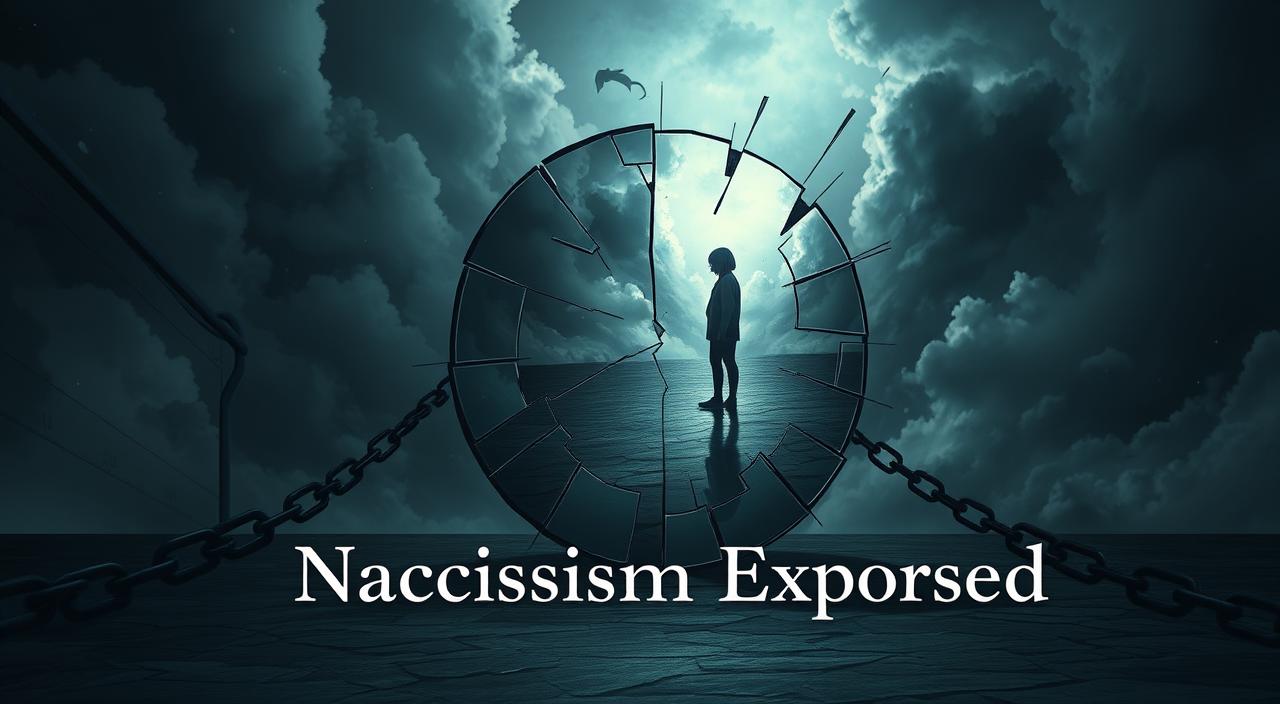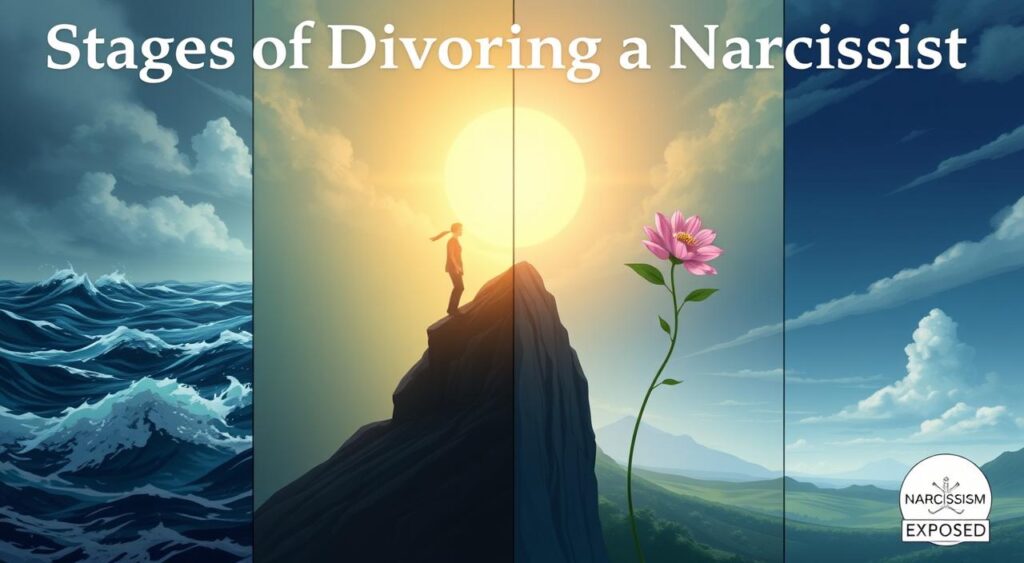Imagine a divorce that’s so tough, it lasts for years. The narcissistic partner keeps filing court motions, trying to win a power battle1. For many, divorcing a narcissist turns what should be simple into a long, hard fight. They use tricks like gaslighting and controlling your money to keep power.
But there’s hope. This guide will give you the tools and advice you need to move on, no matter where you are in the divorce. If you’re thinking of leaving a narcissistic partner or are already dealing with the aftermath, this guide will help. It offers a clear path through the tough times ahead.
Key Takeaways
- Narcissistic Abuse is a hidden kind of domestic violence. It can go unnoticed for years, making victims feel trapped, belittled, and ignored on purpose2.
- People with Narcissistic Personality Disorder use others for their own benefit. They don’t care about others, showing off, controlling, and needing constant praise2.
- Victims of Narcissistic Abuse feel like they’re living in a world where they’re always being pushed down. They face constant fear, emotional, physical, mental, sexual, economic abuse, and being forced to do things they don’t want to2.
- The cycle of Narcissistic Abuse has three stages: Idealize (Love Bombing), Devalue, and Discard. The narcissist first idealizes the victim, then devalues them quietly, and finally, they discard them after making them feel dependent and controlled2.
- Therapy and support groups can help people heal after leaving a narcissist1.
The Nightmare of Divorcing a Narcissist
Divorcing a narcissist feels like going through a tough maze. It leaves a deep emotional scar, trapping people in a cycle of manipulation, deceit, and self-absorption3.
Narcissism 101
Understanding narcissism is key. These individuals dream of being all-powerful and successful. They use others for their own benefit3. They need constant praise and use tricks like gaslighting to control and weaken their partners4.
What Type of Narcissist Are You Divorcing?
All narcissists are tough during a divorce. There are grandiose and vulnerable types. Grandiose narcissists are bold and full of themselves, often in high positions. Vulnerable narcissists hide their low self-esteem behind a mask of confidence3.
Knowing the type of narcissist you’re dealing with helps you plan your move. It’s key to protect yourself from their emotional attacks during the divorce4.
“Narcissists are often described as having an inflated sense of self-importance with a lack of empathy.”3
Most narcissists are men, but there are also narcissistic women3. This behavior can be linked to Narcissistic Personality Disorder (NPD), a serious mental health issue3.
Hire a Kick-Ass Divorce Lawyer
When you’re getting a divorce from a narcissist, finding a great divorce lawyer is key. They need to know how narcissists work and the tricks they use, like gaslighting5.
Gaslighting makes you doubt your own thoughts and feelings. Your ex might deny what they did, turn people against you, or make up stories6. Having a lawyer who knows about these tricks and can handle the legal stuff is vital for your rights and well-being during the divorce5.
Divorces with narcissists are often tough and long5. Facing them in court can be tough because they might try to drag things out or get ahead5. But, with the right legal strategies and a smart lawyer, you can get through it and come out on top5.
Be Prepared for Gaslighting Tactics
Narcissists are experts at manipulating and showing no empathy, making divorce hard6. They might try to get people to dislike you, make false promises, or try to make you react emotionally6. Having a divorce lawyer who knows how to deal with these tricks is key to looking out for your interests7.
With the right lawyer and plan, you can get through a divorce from a narcissist and protect your rights and well-being7.
Do Some Pre-Divorce Reconnaissance
Before starting the divorce process, it’s key to gather as much info and documents as you can. Narcissists often hide assets and play with finances, so it’s smart to keep records of things like bank accounts and property records8. This way, you have the evidence you need to fight back if your spouse tries to hide things during the divorce8.
Getting through a divorce with a narcissist can be tough, as they might try to slow things down or make it hard for you8. It’s important to stay healthy, both physically and emotionally, as dealing with legal costs can be a big challenge8. Getting therapy can help, and it’s wise to pick your battles carefully8.
Having good documentation is key when divorcing a narcissist, especially when it comes to keeping records of what you talk about8. Using their traits to your advantage, like letting them have small wins, can also help make things easier8. Having a good divorce lawyer can really make a difference in how things turn out9.
“The Harris Law Firm provides legal support to the local and international community through deliberate strategic giving efforts. The firm aims to bring strength, happiness, and empowerment to Colorado and beyond through its community support initiatives.”9
When going through a divorce, focus on the behaviors rather than officially diagnosing someone with Narcissistic Personality Disorder (NPD)10. Narcissistic behavior can include manipulation and using loopholes to their advantage, affecting the divorce10. During a divorce, narcissistic rage can lead to toxic behavior towards kids, and alienating parents can be subtle10.
- Gather copies of important financial documents, including bank accounts, property records, tax returns, and other relevant materials.
- Maintain physical and emotional health during the divorce process, seeking therapy for support and focusing on key objectives.
- Utilize written communication and documentation to protect yourself, and consider leveraging the narcissist’s personality traits to your advantage.
- Hire a skilled divorce attorney who can effectively navigate the challenges of divorcing a narcissist and advocate for your best interests.
By being proactive and ready for the challenges of divorcing a narcissist, you can improve your chances of getting a better outcome and protect your finances and well-being8. A good divorce lawyer can be a big help in this process9.
Open an “Armageddon Fund” Before Divorcing a Narcissist: Stash That Cash!
Getting a divorce from a narcissist means you need to be ready financially and prepared for the legal battle ahead. Before you start, it’s smart to set up a secret “Armageddon Fund”. This fund is key to protecting your money and interests11.
Keep this fund in a bank where neither you nor your ex has an account. Fill it up over time by selling items like jewelry, gold, or gifts11. This money will help you pay for lawyers, cover divorce costs, and keep your ex from taking your money11.
“Divorcing a narcissist often requires significant financial resources to navigate the complex legal landscape and protect your interests.”
A strong “Armageddon Fund” is crucial for your financial freedom and getting ready for divorce with a narcissist11. Plan and save for this fund well before you start your divorce11.
Learn How to Negotiate with a Narcissist
Dealing with a narcissist in divorce can be tough. They often want total control and aim to “win” no matter what12. It’s key to have good negotiation skills to get back in control and get what you want12.
One important strategy is to spot and stop manipulation. Narcissists might use emotional tricks, gaslighting, and more to throw you off balance12. Keeping your cool and being clear-headed is vital12. Also, having something to offer the narcissist can make them more likely to agree12.
Getting help from experts like divorce lawyer Rebecca Zung’s “SLAY Your Negotiation with a Narcissist” can give you the skills you need12. Knowing how power works and planning your moves is key to winning12.
Working with a mediator who knows how to deal with narcissists can also help13. They can make the narcissist see the risks of not settling, making negotiations go smoother13. Also, having a divorce lawyer who knows about narcissists and family law is crucial for getting through the divorce13.
- Get ready for tough times, tricks, lies, and delays when talking with a narcissist14.
- Find a skilled mediator to help with negotiations14.
- Send out settlement ideas early to set the stage for talks14.
- Stay patient and focused on your goals14.
- Know and beat the tricks narcissists use, like stretching the truth, making big claims, and offering “take it or leave it” deals14.
Remember, dealing with a narcissist in negotiations means being strategic, strong emotionally, and firm in your stance. With these skills, you can take back control and get a good outcome in your divorce121314.
The Aftermath of Divorcing a Narcissist
The Emotional Toll
Ending a marriage with a narcissist can deeply hurt. The constant put-downs, gaslighting, and lack of empathy can cause emotional abuse, trauma, and mental health problems like depression, anxiety, and PTSD15. Rebuilding self-worth and trust is hard, often needing help from mental health experts and special counseling15.
Divorce Proceedings and Custody Battles
Going through divorce can make things harder for those leaving a narcissist. Narcissists might use the courts to harass and scare their ex, using high-conflict divorce tactics15. They see their kids as part of themselves and might use parental alienation or emotional abuse to keep control in custody fights15. Getting through divorce and custody issues needs a smart plan, with help from experts like child custody evaluators and family therapists15.
Starting over after divorce from a narcissist is tough but possible with the right support and tools. Learning about the special issues of divorcing a narcissist can help people understand and deal with the aftermath15.
“The aftermath of divorcing a narcissist can be profoundly emotionally taxing, as individuals grapple with the trauma of emotional abuse, manipulation, and betrayal.”
Debunking Codependency Myths
Many people misunderstand the relationship between a narcissistic spouse and a codependent partner. It’s important to clear up these myths to help codependents recover. This can help them find their true self and start healing.
One myth is that codependents can fix their narcissistic partners. But, narcissistic personality disorder is hard to change16. Codependents often blame themselves for the bad relationship. They don’t see the narcissist as fully responsible for their actions.
Another myth is that codependents cause the narcissist’s bad behavior. Actually17, narcissists hide their shame behind a mask. Victims get caught in manipulation, not by choice, but because of the abuser’s skills at charming and controlling16.
It’s key for codependents to understand the real dynamics of their relationships16. They need to challenge negative thoughts, set boundaries, and celebrate their wins to build self-esteem16. Getting help from therapists or counselors who know about narcissistic abuse can also be very helpful16.
“Rebuilding self-esteem for victims involves challenging negative self-beliefs, setting healthy boundaries, and celebrating personal achievements.”
By clearing up these myths, codependents can see their part in the relationship more clearly. This helps them work on reclaiming their self-worth and escaping narcissistic abuse16.
Healing Through No Contact
Keeping no contact is key to healing and taking back control after leaving a narcissist. Narcissistic relationships often involve emotional control and18. Cutting ties with the narcissistic ex helps protect your feelings and start healing from the hurt19.
No contact helps set boundaries and stop abuse. It lets you focus on healing and finding yourself again19. This way, you can put your health first and take back your freedom. It’s the first step towards a better life after the toxic relationship.
But, sticking to the no contact rule is hard. Narcissists might try to control you again, like through smear campaigns or playing on shared parenting18. It’s important to stay firm and get help, like from Divorce Doula services, to deal with the divorce’s legal and emotional parts18.
Healing from narcissistic abuse is tough. But by focusing on yourself, building your self-worth, and finding your identity, you can take back your power. The no contact rule is a key part of this, giving you the space to heal emotionally18.
“The main goal of the No Contact Rule is to spot your own weaknesses that narcissists exploit. It’s about protecting yourself and getting back in charge of your life.”19
Whether to go fully no contact or not depends on your situation and the risks. With strong will and the right support, those who’ve faced narcissistic abuse can come out stronger and ready for a fulfilling life.
Untangling and Letting Go
Getting a divorce from a narcissist can be very hard, but you can get your life back on track. It takes a lot of effort and a good plan. Co-parenting strategies and dealing with post-divorce issues are key, especially if you have kids20.
Getting legal help and having a strong support network is crucial. Setting clear rules and keeping your kids safe helps you take back control of your life. Therapy or support groups can help you rebuild your self-esteem and find your identity again after the abuse20.
Recovering emotionally is tough, but you can do it with determination and facing your challenges. Letting go of the narcissist’s control is a big step towards loving yourself and growing personally21.
“The most difficult thing is the decision to act, the rest is merely tenacity.” – Amelia Earhart
Starting this journey of untangling and letting go helps you heal and rebuild your life. It’s a tough path with ups and downs. But with the right support and strategies, you can come out stronger and more resilient than before2021.
Navigating Narcissists’ Reactions
Getting a divorce from a narcissist is tough and emotionally draining. People trying to leave this tough relationship might face many manipulative tactics and abusive behaviors from their ex. Narcissists often feel they are better than others and should get special treatment, even after the marriage ends.22
Narcissists can show up in many ways after a divorce. They might try to keep control, manipulate situations, and question your reality. They might use tricks like gaslighting or making you feel guilty to get what they want from the divorce23. They could also use money to make life hard for their ex or use their kids to bargain23.
It’s important to be ready for these reactions and set clear boundaries to protect yourself. Knowing what narcissists might do and how to react can help you feel powerful and in control after the divorce.22 Keeping track of what the narcissist says and does is key for legal fights. Getting help from a skilled lawyer can also make things easier emotionally and legally.
“Dealing with a narcissistic spouse during divorce can result in a challenging, confusing, and complex process due to their sense of entitlement, need for attention, and lack of empathy.”22
Seeing a therapist or counselor can also help with the emotional effects of divorcing a narcissist. By focusing on self-care and having a strong support network, you can start to heal and take back your power.22
The way a narcissist reacts shows their own deep issues and need for control. By being strong and setting clear boundaries, you can lessen their impact. This lets you focus on your healing and well-being.
Stages of Divorcing a Narcissist
Divorcing a narcissist is tough, filled with emotional abuse and control. Narcissists think highly of themselves and don’t care about. They use tricks to “win,” like making things drag on and turning people against their ex24. Knowing how narcissists act during divorce, like gaslighting and alienating parents, helps people deal better24.
Help! I’m Divorcing a Narcissist
Getting help from experts, like divorce lawyers and therapists, is key. They help you protect your rights and health during divorce24. It’s important to spot signs of narcissistic abuse to move forward25. People affected by narcissistic abuse might feel unsure, helpless, withdrawn, or anxious25.
Signs of Narcissistic Abuse
Narcissists use tricks like gaslighting to make victims doubt their reality25. They also make people rely on their approval, a sign of codependency25. Knowing these patterns helps victims understand their situation and protect themselves.
“Divorcing a narcissist can present extra challenges, with instances like spouses ignoring calls, denying receipt of divorce papers, vilifying the other party, and using children or family members as leverage.”
- Divorcing a narcissist goes through stages like deciding, filing, discovery, negotiation, trial, and adjusting after24.
- Writing things down during divorce is good evidence. Keeping passwords safe and protecting personal info is key24.
- Looking after yourself, having a support network, and making a parenting plan helps with co-parenting24.
- Getting a lawyer who knows about high-conflict divorces is smart. They can handle the legal stuff, show the narcissist’s tricks, and fight for your rights24.
Divorcing a narcissist is hard, but with the right support and plans, you can come out okay25.
Conclusion
Getting a divorce from a narcissist is tough and emotionally draining. But, with the right strategies and support, you can get through it and come out stronger. Knowing that high net worth divorces often involve narcissists26 and understanding their lack of empathy26 helps prepare you for the challenges ahead.
Being financially ready is key, especially when dealing with a narcissist. Make sure to keep all your financial and communication records26. Having a good legal team can also protect your rights. Knowing that divorces with narcissists often involve a lot of conflict27 and may need court intervention26 helps you make better decisions.
During the divorce, take care of yourself, set clear boundaries, and seek help through therapy and support groups. This can help you regain your self-worth and independence. The guide at this link26 offers steps to move forward and start a new chapter of your life. Focus on divorce recovery, moving forward, emotional healing, and rebuilding27.
FAQ
What are the key characteristics of narcissism?
Narcissists dream of being the center of attention and think they’re above everyone else. They use others for their own gain. They need constant praise and use tricks like gaslighting to change reality and weaken their victims.
What are the two primary types of narcissism that can impact the divorce process?
There are two main types of narcissism affecting divorce: grandiose and vulnerable. Grandiose narcissists show off their confidence and think they deserve special treatment. On the other hand, vulnerable narcissists hide their low self-esteem behind a mask of confidence.
Why is it crucial to retain a skilled and experienced divorce lawyer when divorcing a narcissist?
Having a lawyer who knows about narcissistic abuse is key. They can spot gaslighting and other tricks. Your lawyer will help protect your rights and interests during the divorce.
Why is it important to conduct thorough reconnaissance before initiating the divorce process?
It’s smart to gather evidence of your spouse’s hidden assets and financial tricks. This way, you can fight back during the divorce. It helps ensure a fair split of your assets.
What is an “Armageddon Fund” and why is it crucial to have one when divorcing a narcissist?
An “Armageddon Fund” is a secret savings for divorce costs and financial surprises. Keep it in a new bank account. This fund helps you pay for lawyers, cover divorce costs, and stay financially safe from your ex.
How can you develop effective negotiation strategies when dealing with a narcissist during the divorce process?
Learn to stand up for yourself and use negotiation skills. Know how to stop manipulation and stay calm under pressure. Resources like Rebecca Zung’s “SLAY Your Negotiation with a Narcissist” can help you deal with your ex.
What are some of the emotional challenges faced after divorcing a narcissist?
Divorcing a narcissist can be hard emotionally. You may feel depressed, anxious, or stressed from the abuse. Getting help from mental health experts is key to healing and finding your self-worth again.
How can common misconceptions about codependency hinder the healing process?
Don’t believe myths that say you can fix your narcissistic partner or that you’re to blame for their actions. Codependents often blame themselves, but it’s the narcissist’s fault. Understanding this can help you start healing and finding your true self.
How can maintaining no contact be a vital strategy for healing after divorcing a narcissist?
Stopping all contact with your ex helps you heal and protect your feelings. No contact means setting clear boundaries and focusing on yourself. It’s a step towards healing and taking back your life.
What are some of the challenging reactions from a narcissist during the post-divorce process?
Narcissists often feel they’re above the law and deserve special treatment after a divorce. They might try to control you or make things seem like they’re still in charge. Being prepared and setting clear boundaries is important for your safety.
What are some of the signs of narcissistic abuse that individuals should be aware of?
Signs of narcissistic abuse include feeling unsure of yourself, feeling trapped, or feeling anxious. Narcissists use tricks like gaslighting to make you doubt your sanity. Knowing these signs can help you protect yourself and take back control of your life.
Source Links
- How to Divorce a Narcissist – https://www.verywellmind.com/divorcing-a-narcissist-8638181
- Your Legal Guide to Divorcing a Narcissist – Narcissistic Abuse Explained – https://bartonfamilylaw.com.au/narcissistic-abuse-narcissistic-abuse-personality-disorder/
- Stages of Divorcing A Narcissist: Part 1 – https://memphisdivorce.com/divorce/stages-of-divorcing-a-narcissist-part-1/
- The Nightmare of Trying to Separate or Divorce a Narcissist – https://psychcentral.com/pro/exhausted-woman/2016/02/the-nightmare-of-trying-to-separate-or-divorce-a-narcissist
- Divorcing a Narcissist: Six Family Lawyers’ Advice – https://memphisdivorce.com/divorce/divorcing-a-narcissist-six-family-lawyers-advice/
- Divorcing a Narcissist – Alexander & Associates, LLC – https://alexanderfamily.law/divorcing-a-narcissist/
- Hiring a Divorce Lawyer Who Doesn’t Understand Narcissists – Orange County Divorce & Family Law – https://justfamilylaw.com/blog/hiring-a-divorce-lawyer-who-doesnt-understand-narcissists-orange-county-divorce-family-law/
- How to Divorce a Narcissist – https://www.robinsonandhenry.com/colorado/family-law/tips-for-divorcing-a-narcissist/
- The Harris Law Firm – https://www.harrisfamilylaw.com/webinars/divorce/i-am-divorcing-a-narcissist-what-to-expect/
- Divorcing a Narcissist: Breaking the Cycle of Coercive Control – https://www.lynchowens.com/blog/2022/october/divorcing-a-narcissist-breaking-the-cycle-of-coe/
- 50 Ways to Prepare for Divorce in [year] – https://www.survivedivorce.com/prepare-for-divorce
- Divorcing a Narcissist May Be Trickier Than You Think – https://www.smithdebnamlaw.com/article/divorcing-a-narcissist-may-be-trickier-than-you-think/
- You Absolutely Can Negotiate with a Narcissist and Succeed – https://farzadlaw.com/can-you-negotiate-with-narcissist
- How to Negotiate a Divorce Settlement with a Narcissist | Part 5 – https://memphisdivorce.com/divorce/how-to-negotiate-a-divorce-settlement-with-a-narcissist-part-5/
- The Realities Of Life After Divorce From A Narcissist – https://drkarenfinn.com/divorce-blog/life-after-divorce/537-the-realities-of-life-after-divorce-from-a-narcissist/
- Not Codependent: 4 Reasons Why Victims of Narcissistic Ab&se are Abused, Not Codependent – Moving Forward with Hope – https://www.movingforwardafterabuse.com/abused-not-codependent/
- 11 Common Myths About Narcissism Debunked – https://themindsjournal.com/common-myths-about-narcissism/
- Divorcing a Narcissist: Why No Contact is Key to Freedom – https://oliviawallis.com/blog/divorcing-a-narcissist-why-no-contact-is-key-to-freedom
- Setting Boundaries With Narcissist: No Contact Rule – https://medium.com/psychology-self-healing/setting-boundaries-with-narcissist-no-contact-rule-b1b87e3a904c
- Vital Lessons While Healing After Divorcing a Narcissist | By Jen Grice – https://jengrice.com/vital-lessons-while-healing-after-divorcing-a-narcissist/
- How to Emotionally Detach From a Narcissist: 17 Healthy Ways – https://www.marriage.com/advice/mental-health/how-to-emotionally-detach-from-a-narcissist/
- Petrelli Previtera, LLC – https://www.petrellilaw.com/6-strategies-and-tips-for-divorcing-a-narcissist/
- How Does a Narcissist Behave During a Divorce? Tactics and Traits to Know – https://gbfamilylaw.com/divorce/how-does-a-narcissist-behave-during-a-divorce/
- Everything you need to know about divorcing a narcissist – https://www.marble.co/blog/divorce/divorcing-a-narcissist/
- What Is The Cycle Of A Narcissist Divorce? — Judge Anthony – https://www.judgeanthony.com/blog/what-is-the-cycle-of-a-narcissist-divorce
- Divorcing a Narcissist – Divorce Shark ™ – https://divorceshark.net/narcissists/
- [Empowered Divorce Decisions] Divorcing a Narcissist – Argent Bridge Advisors – https://argentbridge.com/empowered-divorce-decisions-divorcing-a-narcissist/

















